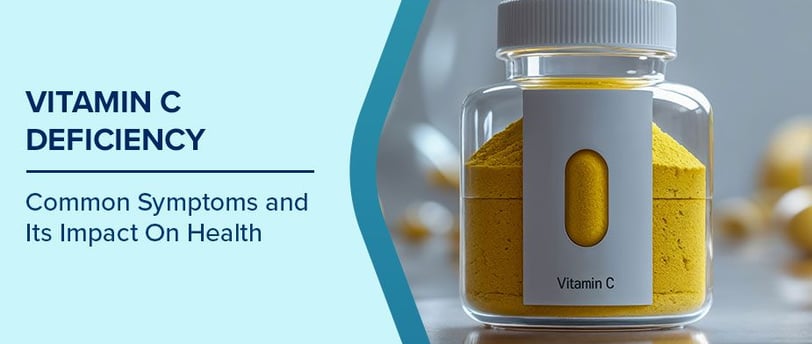
Vitamin C Deficiency: Common Symptoms and Its Impact On Health
6/28/20256 min read


Vitamin C Deficiency: Common Symptoms and Its Impact On Health
Vitamin C is a vital nutrient that helps the body stay healthy. It supports wound healing, keeps your skin and gums in good condition, boosts your immune system, and strengthens blood vessels and bones. As it plays so many roles, having a steady supply is essential. But since the body cannot make or store vitamin C, you need to get it regularly from food - mainly fresh fruits and vegetables. If your diet doesn’t include enough of these, you may develop a deficiency that overtime may lead to more serious problems. To help you understand this better, this blog will explain what causes vitamin C deficiency, what symptoms to look out for, and how to prevent or manage it by making simple changes to your diet. But before we get into all of that, let’s start by understanding the role of vitamin C in our body.
The Role of Vitamin C in the Body
Vitamin C, also known as ascorbic acid, is a water-soluble vitamin that plays many important roles in keeping the body healthy. Here are some of the key functions of vitamin C:
Supports collagen production: Collagen is a protein that helps maintain healthy skin, bones, joints, blood vessels, and connective tissues. Vitamin C is necessary for forming and maintaining collagen.
Aids wound healing: Because of its role in collagen formation, vitamin C helps wounds heal properly and supports tissue repair.
Boosts the immune system: It helps white blood cells work more effectively and protects them from damage, playing a vital role in the body's defence against infections.
Improves iron absorption: Vitamin C helps the body absorb iron from plant-based foods, which can help prevent iron deficiency anemia.
Acts as an antioxidant: It protects cells from damage caused by free radicals—unstable molecules that can contribute to aging and disease.
What Causes Vitamin C Deficiency?
Vitamin C deficiency usually develops when the body doesn’t get enough of this essential nutrient over time. Since the body cannot produce or store vitamin C, even a few weeks of low intake can start to affect your health. Several factors can lead to a deficiency including:
Low intake of fresh fruits and vegetables: The most common cause. People who eat very few fresh fruits and vegetables—due to dietary habits, food restrictions, limited availability, or personal preference—are at higher risk.
Digestive disorders affecting absorption: Conditions like ulcerative colitis can interfere with how well the body absorbs vitamin C from the gut.
Certain types of gastrointestinal surgery: Procedures that remove or bypass parts of the stomach or intestines (such as bariatric surgery) may reduce vitamin C absorption.
Smoking: Cigarette smoke increases the breakdown of vitamin C in the body. Smokers usually need higher amounts of vitamin C to maintain normal levels.
Excessive alcohol consumption: Alcohol can interfere with vitamin absorption and also reduce appetite, leading to poor intake.
Chronic illnesses: Long-term infections, cancer, or kidney disease (especially in patients on dialysis) can either increase the body’s need for vitamin C or lead to faster depletion.
Age-related factors: Elderly may eat less due to poor appetite or physical limitations, which can reduce their vitamin C intake over time.
Severe mental health conditions: People with depression or certain psychiatric disorders may neglect nutrition, increasing the risk of deficiencies.
Common Symptoms of Vitamin C Deficiency
Vitamin C plays a role in many body functions, so a deficiency can lead to a range of symptoms. These often develop gradually and may go unnoticed at first. As the deficiency worsens, the symptoms become more noticeable and may affect your daily life.
Early signs may include:
Tiredness and weakness: One of the first signs. People may feel low on energy or unusually fatigued even with normal activity.
Irritability or low mood: Low vitamin C levels can affect mood and brain function, leading to increased irritability or sadness.
Poor appetite: A general lack of interest in food may develop over time.
As the deficiency progresses, more specific physical signs may appear:
Bleeding and swollen gums: One of the most recognisable symptoms. The gums may appear red, swollen, and bleed easily, especially while brushing.
Frequent bruising: Vitamin C helps keep blood vessels strong. Without enough of it, even small bumps can lead to noticeable bruises.
Slow wound healing: Cuts, scrapes, or surgical wounds may take longer than usual to heal.
Dry, rough, or bumpy skin: Collagen is needed for healthy skin, and without vitamin C, the skin may become dry and develop small, raised bumps—especially on the upper arms, thighs, or buttocks.
Joint pain or swelling: Collagen is also needed for healthy joints. A deficiency may cause discomfort or pain, even without injury.
Tiny red or purple spots on the skin: Known as petechiae, these appear when small blood vessels under the skin break due to weakened vessel walls.
Brittle hair and nails: Hair may become dry and break easily; nails may show ridges or become fragile.
Increased infections: A weaker immune system means more frequent or prolonged infections, such as colds or mouth ulcers.
Anaemia: In some cases, low vitamin C levels can reduce iron absorption, leading to symptoms like pale skin, dizziness, and shortness of breath..
Impact of Vitamin C Deficiency on Health
A prolonged deficiency of vitamin C can have serious effects on overall health. Because this vitamin is involved in many essential body processes, its absence doesn’t just cause minor discomfort—it can lead to long-term damage in multiple organs and systems.
Weakened immune system: Low vitamin C levels can reduce the body’s ability to fight infections. People may experience frequent colds, longer recovery times, or recurring infections like gum disease.
Bone and joint problems: Vitamin C supports collagen production, which is essential for maintaining strong bones and cartilage. A deficiency can lead to joint pain, swelling, and in severe cases, bone weakness or delayed growth in children.
Skin and tissue damage: Without vitamin C, collagen levels drop, leading to fragile skin, poor wound healing, and easy bruising. Over time, even minor injuries can take longer to repair and may leave more noticeable marks.
Oral health issues: Gums can become red, swollen, and prone to bleeding. In advanced cases, the tissue may weaken enough to cause teeth to loosen or fall out—especially if scurvy develops.
Scurvy: This is a severe form of vitamin C deficiency that causes fatigue, joint pain, bleeding gums, poor wound healing, and in extreme cases, internal bleeding or heart problems. Though rare today, it still occurs in people with very restricted diets.
Addressing the deficiency early can help avoid these complications. Most effects are reversible once vitamin C levels are restored through diet or supplements.
How Is Vitamin C Deficiency Diagnosed?
Vitamin C deficiency can be confirmed through laboratory tests that measure the level of vitamin C in the blood. If a doctor suspects a deficiency based on your diet or risk factors, they may recommend one or more of the following diagnostic approaches:
Plasma ascorbic acid test – This is the most common test used to check vitamin C levels. A blood sample is taken to measure the concentration of ascorbic acid (the active form of vitamin C) in the plasma. Low levels typically indicate a deficiency.
Leukocyte ascorbic acid test – Less commonly used but considered more reliable in some cases, this test measures vitamin C levels within white blood cells. It reflects the body’s long-term vitamin C stores rather than recent intake.
Additional blood tests – If the deficiency has been present for a long time, other tests may be done to look for signs of ANAEMIA or inflammation, which can occur as complications of prolonged vitamin C deficiency.
These tests are usually recommended only when symptoms are unclear or when dietary changes alone have not resolved the issue. In many cases, a doctor may begin with a detailed dietary assessment and suggest supplements or changes in diet, monitoring your progress before ordering tests.
Natural sources of Vitamin C
Vitamin C is found mainly in fresh fruits and vegetables. Including a variety of these in your daily meals is the easiest way to meet your body’s needs and prevent deficiency. Here are some of the best natural sources:
Citrus fruits: Oranges, lemons, limes, grapefruits, and sweet limes are among the richest sources.
Berries: Strawberries, raspberries, blueberries, and blackberries provide a good amount of vitamin C and are also high in antioxidants.
Guava: One of the highest sources of vitamin C—much more than citrus fruits.
Kiwi: Just one medium kiwi can supply more than the daily recommended intake.
Papaya and mango: Both tropical fruits contain good levels of vitamin C along with other important nutrients.
Melons: Watermelon, cantaloupe, and honeydew offer some vitamin C, along with hydration.
Pineapple: A refreshing source that also contains digestive enzymes.
Tomatoes: Both raw and cooked forms contribute to daily intake.
Bell peppers: Especially red and yellow ones, which contain more vitamin C than oranges.
Green leafy vegetables: Spinach, kale, and mustard greens contain moderate amounts.
Broccoli and Brussels sprouts: These cruciferous vegetables are not only rich in vitamin C but also support overall immunity and digestion.
